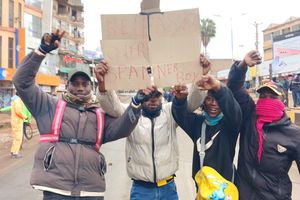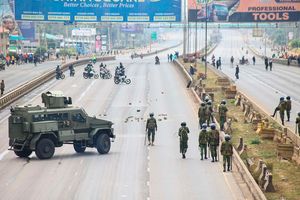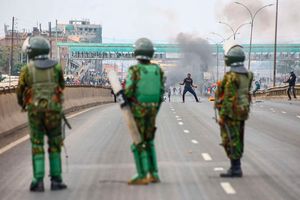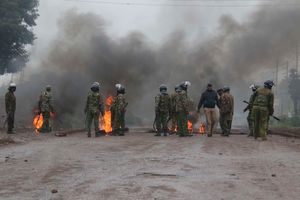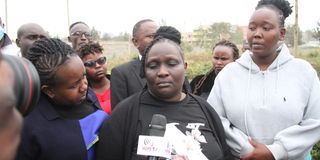
Ms Ann Nyawira Gikunju, mother of Brian Kimutai, with relatives and friends at Kitengela sub-County Hospital mortuary on July 8, 2025.
The last 24 hours have been the longest for Ms Ann Nyawira Gikunju, the mother of Brian Kimutai, who was shot dead during Monday’s Saba Saba commemorative protests in Kitengela town, Kajiado County.
Ms Gikunju had spoken to her 21-year-old son on the phone moments before he was shot, unaware it would be the last time she would hear his voice.
She would go on to "protect" her son’s body for the next 14 hours.

The late Brian Kimutai.
On Tuesday at 11 am, Nation found Ms Gikunju at the Kitengela sub-County Hospital morgue pleading with mortuary attendants to admit her son’s body.
The facility had initially declined, sparking a standoff that lasted hours.
Ms Gikunju told Nation that on Monday, amid the height of protests, she received a call from one of Brian’s friends informing her that he had been shot and rushed to Kitengela Hospital in critical condition.
She rushed to the hospital from her kiosk, but by the time she arrived, chaos had broken out after Brian was pronounced dead on arrival.
“When I arrived at the facility, my son’s body was lying on a trolley in the emergency department, surrounded by his friends and protesters.
“I overheard one of the police officers say they were planning to move the body to the City Mortuary and I urged my son’s friends to stay put.”
What followed was lawlessness at the facility, forcing medical staff and patients to flee as protesters lit bonfires at the hospital entrance.
For nearly five hours, the hospital was inaccessible.
Around 7.35 pm, the family moved Brian’s body to their rented residence in the Miriam area, just 100 meters from the hospital.
On Tuesday morning, they returned to the Kitengela sub-County Hospital morgue seeking admission but were again turned away.
After DCI officers processed the body, the family moved it to Shalom Hospital in Machakos County.
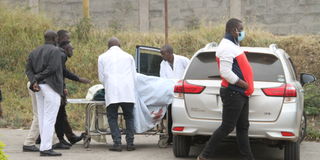
Kitengela SubCounty hospital mortuary attendants removing the body of Brian from a private car for DCI processing on July 8 2025.
Ms Gikunju said the body remained on the co-driver’s seat of a station wagon parked outside overnight, under the watchful eyes of family and friends.
“We suspected the police wanted to seize the body to tamper with evidence. We could not allow that. That is why we took it away from the hospital on Monday night,” she said.
She further claimed her son was killed by a police officer known to the family with whom Brian had a long-standing dispute over a boda boda (motorcycle taxi) business.
The Monday protests left Kitengela Hospital with broken windows and a tense atmosphere among patients.
By Tuesday morning, however, normalcy had begun to return.
Health workers' unions condemned the chaos with the Kenya Union of Clinical Officers (Kuco) and the Kenya National Union of Medical Laboratory Officers terming the incident a threat to health professionals nationwide.
They called on the government to deploy armed officers to guard hospitals in protest-prone areas.
“We want Kenyans to know that health workers are neutral. In times of war, medics are protected because they save lives. “The Occupational Health and Safety Act allows us to withdraw from unsafe workplaces. If we don't see proper protection during future protests, we’ll ask our members to pull out,” said Kuco Chairperson Peterson Wachira.
The labotarory workers' chairperson Nicholas Odipo described the hospital attack as “self-destruction” that could trigger a national health crisis.
Kajiado Governor Joseph Ole Lenku, who visited the hospital to assess the damage, urged security agencies to expedite investigations and bring the perpetrators to justice.
“Any act that threatens the safety of our frontline workers or undermines essential medical care is not only irresponsible but also indefensible. Such actions have no place in our society,” he said.

